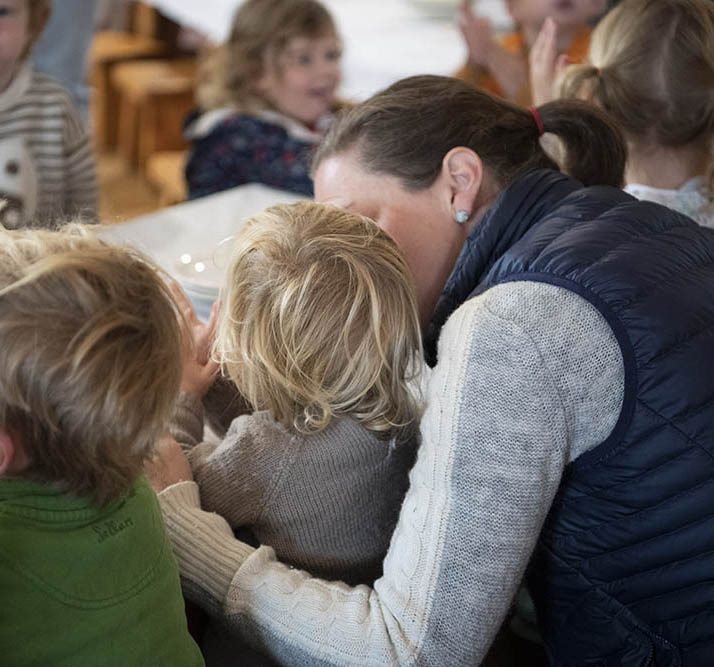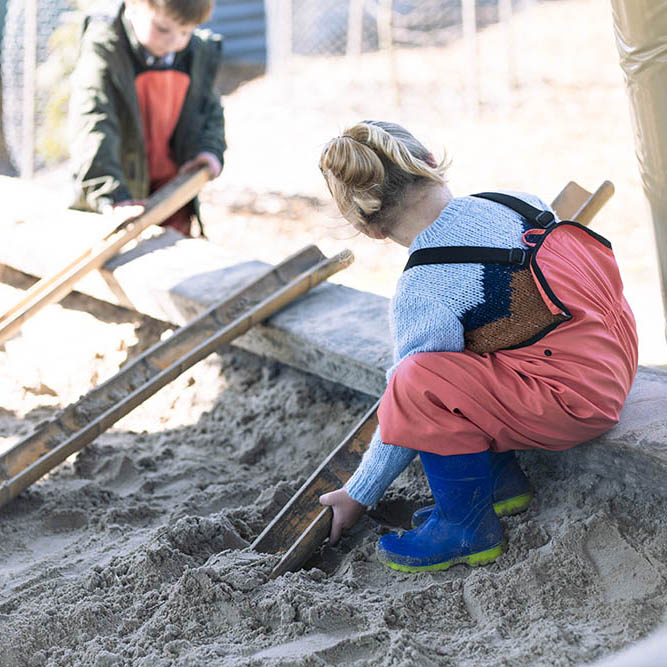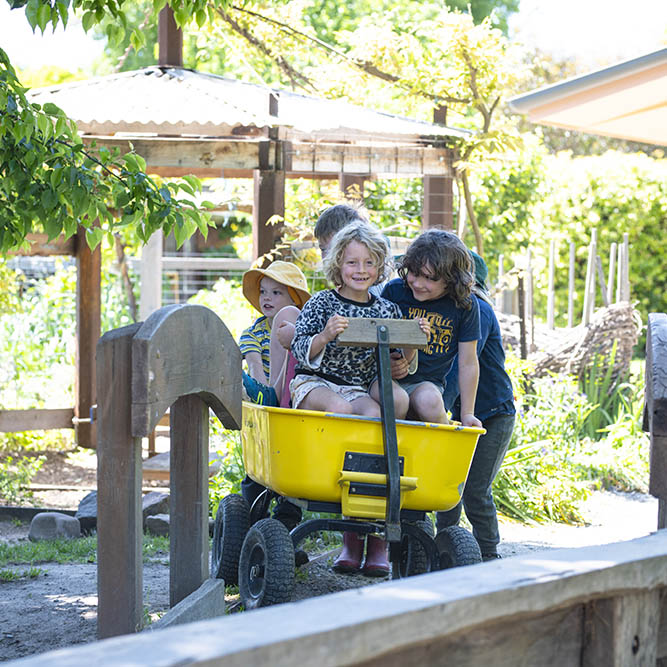EARLY CHILDHOOD
Early Childhood
– enjoying an unhurried childhood
Steiner education is centred upon meeting the needs of the child’s developing motivation or will. A young child’s work is play. The early childhood program is focused around activity and play, in a colourful environment equipped with natural, basic materials. Early Childhood consists of Morning Star Kindergarten (a group for those turning four, and a group for those turning five) and Rosa Mundi Prep.
Steiner describes the child’s life forces, particularly in the first seven years, as being primarily engaged in the development of the physical body. Play is essential for children to grow physically healthy. Through play they develop fine and gross motor skills and learn through sensory exploration. Play also develops a child’s motivation or will, and is the “work” of childhood. Gross and fine motor skills and appropriate, holistic sensory exploration, lay the foundations for later academic learning. There is so much essential foundation work to be done in these early years, which is why Steiner suggests we do not prematurely focus on early intellectual activity, it may be at the expense of healthy physical development and later academic learning.
Early Childhood is also an optimal time to create emotional wellbeing and learn social skills. It is easier for children to learn when they feel safe and secure. We aim to create a caring environment, with predictable expectations and a strong rhythm and routine. Our play-based program, guided by teachers, provides ample opportunity to learn life-long social skills.
The children’s faculty for imagination also develops in early childhood as they call up from within themselves the pictures and experiences they are absorbing from life. They express themselves and make sense of their world through activity and play. Imagination is important for later creative thinking and innovation.
“We are fully human only while playing, and we play only when we are human in the truest sense of the word.”
Rudolf Steiner

Playgroup
We are so excited to offer playgroup again this year. Playgroup is a weekly gathering of parents/guardians and their small children. It is a wonderful way to become familiar with the Morning Star environment and rhythm, which is quite similar to kindergarten: baking, inside play, morning circle, morning tea, outside play and story time. Children can play amongst themselves while parents share experiences. The group is facilitated but requires parent support to help things run smoothly.

‘Morning Star’ Kindergarten
The Morning Star Kindergarten program offers a play-based curriculum that fosters the child’s physical, social, emotional and cognitive development. The surroundings are orderly, beautiful and calm, inviting the child to engage in learning in a secure, creative and inspiring environment.
Through active investigation of the natural environment the child’s innate sense of wonder is fostered. A reverence for the rhythm of the seasons and the beauty of our world lays the basis for future environmental stewardship.
Strong foundations for literacy are developed through verse, song, rhythms, rhymes and stories. Our arts and craft activities–beeswax modelling, painting, drawing and wool crafts– develop dexterity and an appreciation of beauty and craftsmanship.
Healthy social relationships are nurtured through a balance of play and structured activities.
Children in the Morning Star program learn to share, take turns and listen to one another. They engage in practical activities such as cooking and gardening. The child’s desire to learn by doing is fulfilled. A sense of clear, unpressured achievement strengthens the child’s will and self-esteem. Children actively develop good learning habits and a sense of gratitude. They work in an environment that is considerate and respectful so that school becomes a special, valued place.
The program is attuned to the developmental needs of the child. Each child is born with a natural curiosity for the world, a sense of wonder, a spontaneous joy in simple things, a lively enthusiasm for living. Our teachers work with this in mind.
Morning tea and lunch are shared at the table. Songs, finger-plays and a simple story, perhaps acted out with props or puppets are shared each day. Opening and closing verses and the mealtime grace are repeated throughout the year and the children develop a familiarity and sense of security.
Children in the Morning Star program are turning four and five years of age within the calendar year.
The Morning Star Kindergarten.
Honeybee group for 3yr old children : Mondays and Wednesdays- 8.45am – 2pm
Echidna group for 4 year old children: Tuesdays, Thursdays and Fridays- 8.45am-3.15pm (Please note: Fridays we include a nature based program onsite)

Rosa Mundi Prep
The focus of the Rosa Mundi year is one of “preparation”. The program endeavours to lay the foundation for physical health and vitality. It fosters a sense of wonder and an interest in the world. Children cultivate an inner readiness to learn and meet the world through personal experiences. Children develop their ability to form meaningful relationships, and embark on a journey of lifelong physical, emotional, intellectual and inner development.
Rosa Mundi children follow a structured program with a balance of experiential learning and creative play. The focus of the program is to encourage children through experiences. By physically doing the young child grows in their physical development, speech and oral language, mental abilities and attitude towards learning. The program follows a rhythmical, harmonious and secure daily routine. Emphasis is given to creating a balance in challenging and restful activities, both within the day and over each week. The children’s work reflects the seasons of the year and is celebrated with social festivals.
Play is recognised as a serious and vital activity through which the children’s powers of creativity, imagination and initiative are cultivated. Young children learn through play, approaching it in entirely individual ways and out of their unique experiences of the world in which they live. The environment is ordered, clean, natural and organic and is set up in a way to safeguard healthy play. Using open-ended play materials enables the child to develop their imagination and sense of creativity. Simple objects, with no predetermined use, enable children to find endless possibilities in their play. Children are fully immersed in the activity of play; planning, designing and problem solving in activities that come freely from their own intrinsic motivation–carried by their own will and engagement with others. We aim to foster enthusiasm, joy and wonder for life in an environment of goodness, beauty and imagination.
Solid foundations for language skills are laid through rich oral language experiences. We see a genuine love of language grow through repetition of verse, song, rhythms, rhymes and stories. Movement accompanies these experiences developing a child’s fine and gross motor skills. The teacher also aims to enrich the children’s oral language and provide opportunities for them to develop social awareness through encouraging respectful interactions.Each day the children and the teachers come together for morning circle: they sing songs, recite verses and poems and participate in dances and finger plays. Later in the day we all meet again for story time, where they are exposed to traditional folk and fairy tales and simple nature stories.
“If you want your children to be brilliant, tell them fairy tales. If you want your children to be even more brilliant, tell them even more fairy tales.”
Albert Einstein
Numeracy skills are introduced through formal and informal experiences with pattern recognition and through imagination, imitation and creative play. Numeracy skills are embedded as the children stack, measure, sort, collect, gather and count, and sing number rhymes. Problem solving and communication skills are fostered through interactions with the teacher and peers.
The child in their first seven years wants to be physically active, learns by imitation, and lives in a world of “doing”. The Rosa Mundi program fulfills this need for physical movement by supporting learning through imitation as a fundamental key to developing successful confident children. Cognitive, social, emotional and physical skills are afforded equal value and many different competencies are developed. Children need time and opportunity to practice practical and useful skills. They engage in domestic activities where they feel a sense of achievement and challenge through contributing to, caring for and creating something beautiful. The simple acts of cleaning, sweeping, digging, weeding, building, kneading, sewing and preparing a meal, support the healthy development of well-rounded confident and capable learners ready to meet the challenges of the next stage of development.
Children in the Rosa Mundi class ideally will turn six and demonstrate Class 1 readiness before they embark on their “Big School” journey. The child will then begin their six-year journey with a Class Teacher. The activities in the Rosa Mundi program support the development of the young child in readiness for formal academic learning. Children are well prepared, ready to learn and they progress quickly.